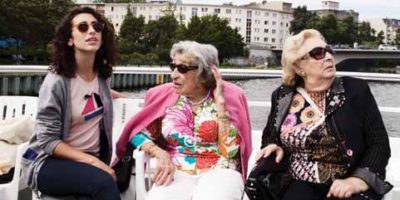Jewish Filmmaking—Curse or Calling?
it’s dangerous to go to jewish film festivals. It could turn you into a Jewish filmmaker.
One Jewish film’s OK, but two? You’re on dangerous ground.
Back in 2005, Diana Groó, Hungarian filmmaker, was in Amsterdam to show her first feature, “Miracle in Krakow,” at the Jewish film festival. When Rabbi Elisa Klaphek approached her to make a film on Regina Jonas, the world’s first woman rabbi (ordained in Berlin in 1935) and the subject of a biography Klaphek had written, Groó resisted. ‘”My first feature was Jewish. I wanted to make something different.”
Her next film, “Vespa,” was a road film about a 10-year-old Roma boy who rides a motor scooter from the countryside to Budapest. It’s a mix of documentary and fiction. Groó, who characterizes herself as part of the artistic underground, knows she’s not going to win establishment friends in Hungary as she keeps gravitating toward sensitive social issues. She says that Roma (once called Gypsies), Jews and homosexuals are today the main targets for Hungarian neo-Nazis and nationalists.
By the time Groó got interested in Rabbi Regina Jonas, all those who knew Jonas — and whom Klaphek had interviewed — were no longer alive. But Groó did it — without “expert” talking heads or slow pans over documents. “Regina” is, in the filmmaker’s words, “a poetic documentary.” It’s based on a single photograph and a trove of letters and newspaper clippings Jonas had safeguarded from the Nazis. (See “Meet on Screen the First Woman Rabbi,” http://lilith.org/blog) Not just Groó’s calling card at Jewish film festivals, “Regina” was also screened at the UNESCO Palace in Paris for this year’s International Holocaust Remembrance Day.
It’s hard to believe Groó, born in 1973, needs to keep proving that she’s not afraid to be Jewish.
She and her identical twin sister grew up in Budapest, where their own Jewish history was never discussed. At 10, they were determined to find out their family story from their maternal grandmother, who had survived four concentration camps. “One of my first memories, at the age of four, was seeing the number from Auschwitz on my grandmother’s arm.” Their own mother only found out at age eight — from Jewish classmates — that she was Jewish. Groó’s parents’ generation “got a kind of silence. My grandparents’ generation stopped talking about their Judaism. They just decided to start a new life and tried to save us from the past.”
Groó speaks of herself as part of the traumatized third generation. “We broke the silence,” she says. “We wanted to know everything.” Groó was 17 when she first fasted on Yom Kippur. “It wasn’t for religious reasons,” she says. “My grandmother was 17 when she was deported. She came from a big family and was the only one who survived. Fasting was the minimum I could do.” And now — “I want to be a proud Jew, but I’m always reminded in a negative way that I am Jewish.” She’s received hate mail, and quotes one letter: “You are a dirty Jew who makes film and humiliates Hungarian blood. You are betraying the country.”
With responses like that, what will her next film be? After the meticulously researched documentary “Regina,” she had wanted to make a feature film on the life of Rabbi Jonas. The story has everything –defiance, impoverished beginnings, a brilliant mind, an almost mystical call to the religious life, guts and determination, and, at the end, true love in the shadow of the Holocaust.
But modern Hungary is pushing Groó into what she considers a more urgent subject. She doesn’t mince words: “I live in a country where neo-Nazis in military uniform march on the streets and the current right-wing government does not stand up against racism. Choosing a Jewish topic comes always from a painful feeling, that I lost something from the past, or the stories simply find me and I cannot resist.”
She accuses her native land of continuing to deny its past: “Hungary was one of the last countries, in 1944, in the last minute, that offered its Jews to the Nazis. Hungary is still one of the countries not able to face its history. What’s missing is education.”
Lest there be doubt, at Easter time two years ago, a member of the extreme right in Parliament dragged up the 1883 blood libel against Jews accused of killing a Hungarian peasant girl. The MP, Zsolt Baráth, was accused of anti-Semitism and urged to resign for criticizing the 19th century verdict that found the Jews innocent. This is not enough for Groó: “One hundred and thirty years after this false accusation, it can’t happen again. I decided to make a film about the lawyer who defended the Jewish people. I want to open people’s eyes to what really happened.”
What film would she make if she had an unlimited budget and could pick any subject? She pauses. “I’d probably make the films I’m making right now.”




